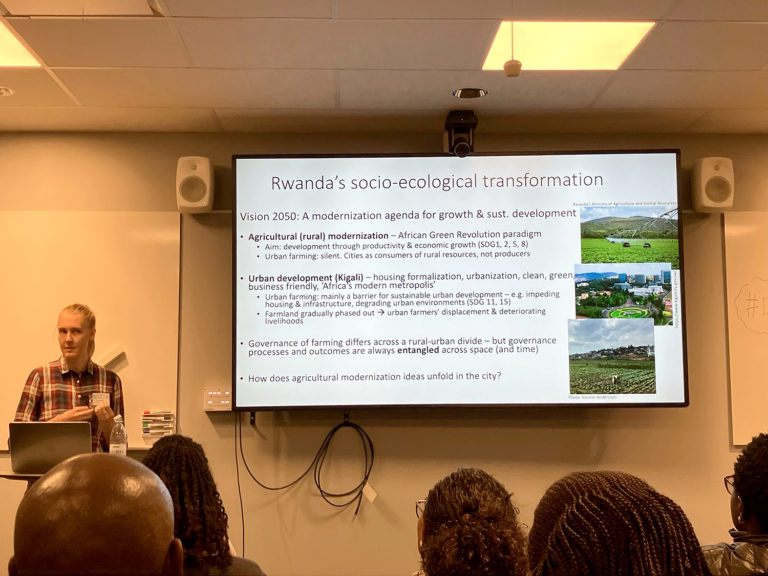This blog post is written by Emelie Zonabend König, research advisor at SLU Global.

PhD student Karolin Andersson, SLU, presenting at DevRes.
Photo: Emelie Zonabend König
DevRes (the Development Research conference) is a bi-annual conference gathering Swedish development and sustainability researchers from different academic disciplines to exchange ideas and network as well as promote collaboration with practitioners, organisations and policy makers. DevRes 2024 was hosted by Lund University and the conference theme was “Reaching the Sustainable Development Goals in a polarised world”.
Although I missed the critical discussions on the first day, it quickly became clear that the exchanges taking place were of great importance. Among other things, the Swedish Research Council presented their newly published report “Development research at the Swedish Research Council 2013-2023”. It is a nice piece worth reading.
During the conference we heard about concrete projects showing how development research has led to tangible benefits. For instance, one project focused on improving maternity care by training healthcare workers, by among other things letting the pregnant woman sit on a stool while giving birth and leaning on a support person which has helped reduce birth-related injuries in several African countries. Another project showcased how collaboration with NASA enhanced systematic air quality monitoring in Ethiopia. These examples underscore the real-world impact of development research when it is applied effectively.
Yet, while the outcomes of development research are inspiring, the field has faced significant challenges in Sweden. In recent years, Swedish development researchers has grappled with severe funding cuts, including the complete elimination, and the government has been phasing out Agenda 2030 from the mandates of its authorities, which has raised concerns about Sweden’s commitment to global development goals.
A new troubling development that was discussed during the conference is the decision by Formas, the Swedish Research Council for Sustainable Development, to limit external collaboration by allowing only 15% of research funding to go to researchers outside Sweden. Interestingly, the Swedish Research Council (Vetenskapsrådet) has taken a different legal interpretation, suggesting there may be room for policy reform. This will be interesting to follow.
DevRes 2024 gathered representatives from 35 different universities and offered more than just a space to express concerns — it provided a platform for researchers to come together, present their fascinating research, share ideas, learn from each other, and brainstorm about new ways forward. In a time when development research faces immense challenges, the opportunity to network and support each other is more important than ever. We must find creative solutions to navigate the changing funding landscape, while celebrating the excellent work being done across the globe.
The conversations and collaborations we build are crucial. As much as we value the technical insights, it’s the human connections that will propel us into the future. We must continue to meet, discuss, and challenge each other. We also need to share the relevance of our work outside of our own choir, and I was glad to hear that the steering of SweDev took the main role to write a debate article about the harsh situation for Swedish development researchers. This was later published in Altinget.
A big thank you to the organisers and all others involved in making DevRes 2024 such a success. Even in the face of setbacks, let’s keep these conversations going and work together to ensure that development research continues to thrive.
